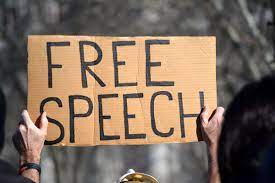
In political life, free speech is essential to ensure that the citizens can and do provide opinions and beliefs. In India, the right to free speech and expression is a fundamental right.
Hate speech is not a new phenomenon, and instances of hate speech have increased at an unprecedented rate in recent times, posing complex challenges in this interconnected world. Hate speech has resulted in increased discrimination and violence, halting economic development, and escalating armed conflicts in some war-torn regions of the world. In recent months, there has been extensive media coverage of occurrences involving supporters of the Khalistan movement living in Western nations destroying temples and Indian embassies while staging violent protests. It was alleged that India is involved in the killing of Khalistani Canadian citizens on Canadian soil, with one Indian diplomat purportedly implicated directly in one such incident. Indian diplomats were consequently ordered back from Canada, which led to problems in the diplomatic ties between India and Canada.
This chain of protests, agitations, and accusations prompts a critical inquiry into the struggle faced by Western nations in striking a balance between the fundamental right to free speech and the proliferation of hate speech within their jurisdictions. Despite being a global issue, laws regulating hate speech have been lacking specific guidance necessary to address this issue effectively. It raises the question of having an effective international legal framework that safeguards a nation from hate speech within the jurisdiction of another state.
In political life, free speech is essential to ensure that the citizens can and do provide opinions and beliefs. In India, the right to free speech and expression is a fundamental right under Article 19(1)(a) of the Indian Constitution to ensure the free exchange of ideas, specifically when it comes to dissent and diverse opinions. While an individual has the right to participate in decisions that affect him, the line drawn through reasonable restrictions is to be respected. While there is no formal definition of “hate speech” in international human rights law, and it is still contested whether the international practice and framework of regulating hate speech have gained international customary law status or not, several international treaties discuss the right to freedom of expression involving aspects of hate speech.
Article 19 of the International Covenant on Civil and Political Rights (ICCPR) states that everyone has the right to express opinions without interference along with freedom of expression, to seek, receive and impart information and ideas of all kinds, regardless of frontiers, either orally, in writing or in print, in the form of art, or through any other media of his choice. This right is subject to certain restrictions, such as respect for the rights or reputations of others, protection of national security or public order, or public health or morals. Likewise, Article 20 of ICCPR prohibits any propaganda for war and any advocacy of national, racial, or religious hatred that constitutes incitement to discrimination, hostility, or violence. Article 25 of ICCPR guarantees every citizen the right and the opportunity without any distinction and unreasonable restrictions to take part in public affairs directly or through elected representatives but without any reasonable restrictions as opposed to the constitutional right. The primary challenge of addressing the issue of hate speech under international human rights law is to strike a balance between the right to freedom of expression and the other protected rights, such as the rights to non-discrimination, security and bodily integrity, and reputation.
When these rights are violated against another state, there is an absence of any definition of hate speech under international law. Under the International Convention on the Elimination of Racial Discrimination (ICERD), states are obligated to criminalise the dissemination of ideas based on racial superiority, which is still different from the prohibition of any advocacy of national, racial, or religious hatred.
In this light, there is a need to look into various laws governing hate speech in different jurisdictions like Germany, France, and the USA from a comparative perspective, which may provide an answer to developing a common definition of hate speech at the international level. In Germany, the German Federal Criminal Code prohibits public incitement to criminal behaviour under section 111 of the code. In contrast, in France, the Press Freedom Act of 1889 is the relevant legislation concerning hate speech that prohibits the publication of defamatory or insulting material. The United States lacks a hate speech exception to the First Amendment, which protects freedom of speech without regulation.
This comparative study seeks not only to delineate the differences in hate speech legislation but also to navigate towards a harmonised understanding of hate speech regulation on an international platform, fostering a nuanced approach that reconciles the fundamental right to free speech with the imperative to curb hateful rhetoric.
Abhinav Mehrotra is Assistant Professor at O.P. Jindal Global University
Amit Upadhyay is an Associate Professor at O.P. Jindal Global University